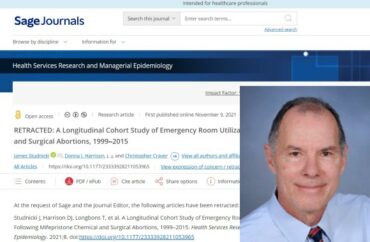
Journal has ‘blatant double standards,’ doesn’t apply same criteria to pro-abortion research: authors
Pro-life researchers confirmed plans this week to take legal action against Sage Journals after the academic publication retracted three of their abortion studies.
Lead researcher James Studnicki, (pictured) vice president of the Charlotte Lozier Institute and former faculty at Johns Hopkins School of Hygiene and Public Health, told The College Fix the journal has demonstrated “blatant double standards” in its retractions that involve conflicts of interest disclosures.
“Our team of researchers has refuted every single critique about the research and we encourage all to read the studies to understand the reasoning behind the methodology and our rebuttals to the critiques,” Studnicki told The Fix in an email last week. “There is no legitimate reason for Sage’s retractions.”
On Wednesday, the Charlotte Lozier Institute told The Fix via email that their research organization “is pursuing appropriate legal action.”
“Sage’s actions have unnecessarily and demonstrably harmed” the researchers’ professional reputations, their attorney David Shaneyfelt wrote in a letter to the journal Nov. 29 after being informed of the potential retractions.
Journal issues 3 retractions
Sage Journals announced the retractions Feb. 5 on its website. Among other problems, the journal said the researchers stated they had no “conflicts of interest” even though they were affiliated “with pro-life advocacy organizations, including Charlotte Lozier Institute.”
Sage issued the retractions after two independent “experts in epidemiology and public health” reviewed the research and gave the authors a chance to respond, according to the announcement.
Two of the studies involved emergency room visits connected to complications from the abortion drug mifepristone, and the third examined doctors who perform abortions and their hospital admitting privileges.
In its announcement, Sage Journals said authors “declared no conflicts of interest,” but almost all of them had affiliations with pro-life advocacy organizations that “support judicial action to restrict access to mifepristone.”
The Fix contacted Sage Journals by email twice in the past two weeks with questions about the retractions and the pro-life authors’ contentions. The Fix received an automated message Feb. 18 stating that Sage is experiencing a high volume of inquiries at this time which may cause delays in response time.
Pro-life scientists respond
Studnicki told The Fix that one of the problems with the journal’s argument is its editors have not applied the same standards to researchers affiliated with pro-abortion groups.
He said Sage published a 2010 article by the Guttmacher Institute, a pro-abortion research organization, with “no disclosures.”
Another example, Studnicki referred The Fix to a 2012 study “led by an abortionist with all authors affiliated” with the pro-abortion Bixby Center for Population, Health, and Sustainability – again with no disclosures.
In contrast, all of the pro-life researchers in the three retracted studies complied with Sage’s policies regarding conflicts of interest, including their organizational affiliations and funding from CLI, Studnicki said.
“This blatant double standard is unacceptable,” Studnicki said. “To date, Sage has advanced no valid objection to their findings and has shown no evidence of any major errors, miscalculations, or falsehoods.”
In the Nov. 29 letter, the researchers’ attorney said the journal is inconsistently applying its conflict of interest reporting requirement “across the ideological spectrum with respect to abortion.”
Shaneyfelt said the journal must stick by its mission to “advance knowledge and maintain the integrity of effective and informed scientific discovery.”
“Should Sage fail to do so, it will leave our clients with no choice but to protect and defend their rights,” he wrote.
OB-GYNs defend study
Other affiliations that Sage cited as presenting a conflict of interest included the American Association of Pro-Life Obstetricians and Gynecologists and the Elliot Institute.
AAPLOG also defended the research by its affiliated medical doctors in an email to The Fix this week.
“The three studies Sage Publications has retracted are scientifically sound and reliable,” AAPLOG stated. “No valid objection to their findings have been raised, nor has any legitimate reason for their retraction been offered. Sage’s actions will adversely impact evidence-based reproductive healthcare to the grave detriment of our women patients.”
Studnicki told The Fix the retractions are indicative of a wider problem with ideology replacing open inquiry in scientific institutions.
“Rather, we’re seeing a biased elite faction across the medical community with all the power attempting to suppress any research that cuts against their approved, pro-abortion narrative. Scientific research and publication should be grounded in science, not driven by ideology,” he said.
The retracted articles, published in 2019, 2021, and 2022, can be viewed on the Charlotte Lozier Institute website assaultonscience.org.
MORE: Professor critical of gender ideology says retracted paper will be published elsewhere
IMAGE: Charlotte Lozier Institute
Like The College Fix on Facebook / Follow us on Twitter






Please join the conversation about our stories on Facebook, Twitter, Instagram, Reddit, MeWe, Rumble, Gab, Minds and Gettr.